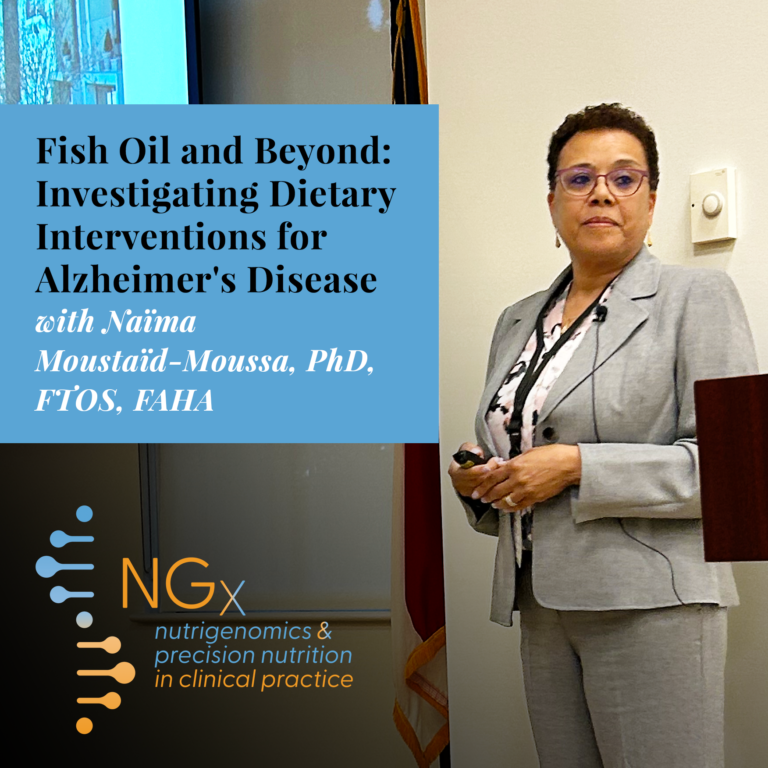We were honored to host Naïma Moustaïd-Moussa, PhD, FTOS, FAHA, a Horn Distinguished Professor of Nutritional Sciences and director of the Obesity Research Institute at Texas Tech University, as the keynote speaker at our biannual NGx short course. Her research focuses on adipocyte biology, the role of fat cell inflammation in metabolic disorders, the link between obesity and breast cancer, and mechanisms by which bioactive food and plant components reduce inflammation and insulin resistance.
A RENOWNED SCIENTIST
Moustaïd-Moussa began her presentation with an overview of her career journey. A native of Morocco, she started her secondary education at Mohamed V University in Rabat. From there, she continued her undergraduate degree in Cell Biology and Physiology at the University of Paris Sud-Orsay in France. Moustaïd-Moussa received her MS and PhD in Endocrinology at the University of Paris P & M Curie, France. She then moved to the US for a postdoctoral fellowship in molecular nutrition, funded by the Juvenile Diabetes Research Foundation (JDRF), at Harvard School of Public Health in Boston, MA.
Moustaïd-Moussa joined the faculty at The University of Tennessee (UT) in 1993 and was promoted to the rank of full professor in 2003. She held appointments at UT Knoxville and UT Institute of Agriculture in the departments of Nutrition, Animal Science, and Family & Consumer Sciences, and as co-director of the UT Obesity Research Center. She was recruited to Texas Tech University (TTU) in fall 2012 as a Nutritional Sciences Senior Strategic Hire in Obesity. She founded The Obesity Research Cluster in 2013.
THE RESEARCH
Moustaïd-Moussa presented her talk, Fish Oil as a Potential Therapy for Metabolic and Alzheimer’s Diseases. She began with the reported effects of EPA (Eicosapentaenoic acid) supplementation on inflammation and obesity. The medical complications of obesity are vast. From various types of cancer to liver disease and diabetes, obesity-associated diseases have many immunological complications.
Moustaïd-Moussa’s research regarding Alzheimer’s began with bioactive compounds. These compounds offer additional nutritional components that are biologically and physiologically active, imparting health benefits that extend beyond basic nutritional functions. The lab studies various compounds, including turmeric, fish oil, tart cherry, green tea, and carrots. These nutrient-dense foods are promising therapeutic tools for disease prevention and treatment. Moustaïd-Moussa’s research seeks to answer the question – does EPA prevent and/or reverse diet-induced obesity and inflammation?
Building upon the exploration of bioactive compounds, Moustaïd-Moussa’s lab delved into studying the metabolic effects of fish oil, particularly EPA, in an obese amyloidogenic Alzheimer’s disease (AD) mouse model. The mouse study showed that EPA reduced body weight and restored glucose tolerance in high-fat fed mice. It also lowered triglyceride deposition in the liver. This led the lab to research the metabolic effects of fish oil in an obese amyloidogenic Alzheimer’s disease (AD) mouse model. AD is a chronic, progressive, and irreversible neurodegenerative disorder.
By 2050, the number of people over the age of 65 who will be diagnosed with AD will be 12.7 million. Alzheimer’s disease is the sixth leading cause of death in the United States, and two-thirds of Americans with the disease are women. The risk factors for the disease range from unmodifiable (age, sex, genetics) to modifiable determinants including diet, blood pressure, obesity, and depression. Due to fish oil’s well-known anti-inflammatory and triglyceride-lowering effects, along with its potential to reduce the risk of cognitive impairment in epidemiological studies, it was presented as a nutritional intervention for AD.
THE RESULTS
Amyloid beta (Aβ) plaques are one of the two lesions in the brain that define the neuropathological diagnosis of Alzheimer’s disease. Systemic inflammation can lead to neuroinflammation, which in turn may result in the formation of Aβ plaques, a hallmark of Alzheimer’s disease. In the mouse study, Moustaïd-Moussa’s lab found that, while a high-fat diet increases inflammation and amyloid-beta plaque in the brain, EPA supplementation decreased them. Future studies are needed to confirm pathways and mechanisms mediating the protective effects of EPA in the brain and ultimately, validation in clinical studies.

